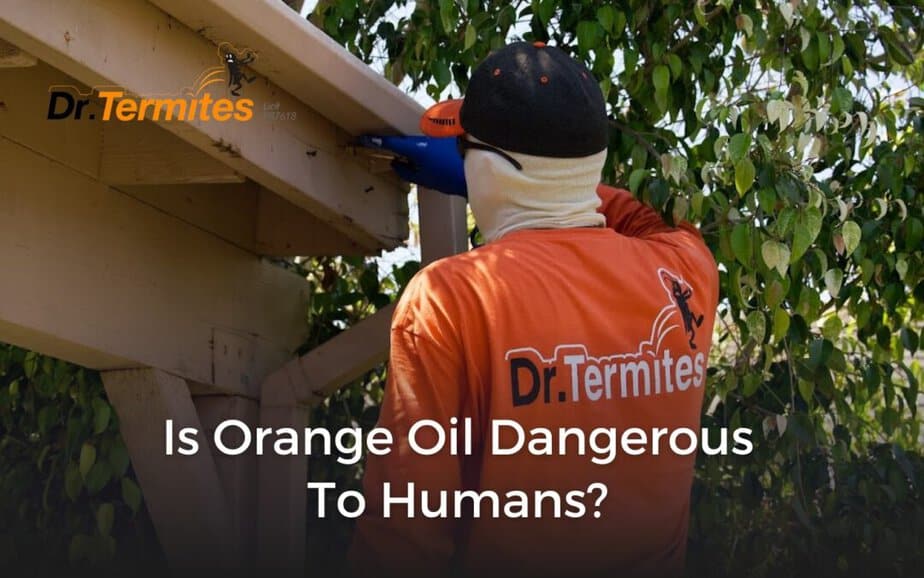
by pestcontrolseos | Jul 19, 2024 | Blog
Orange oil, derived from orange peels, has gained popularity in recent years as a natural alternative to traditional pest control methods. Its fresh citrus scent has versatile applications, ranging from aromatherapy to cleaning products. However, its most intriguing use lies in pest management, particularly in the treatment of drywood termites.

The Science Behind Orange Oil
At the heart of orange oil’s effectiveness is a compound called d-limonene. This naturally occurring chemical makes up about 90-95% of orange oil and is responsible for its potent insecticidal properties. D-limonene works by dissolving insects’ exoskeletons.
Orange Oil Treatment in Ventura: A Natural Pest Control Solution
In Ventura, California, where termite infestations can be a significant concern for homeowners, orange oil treatment has emerged as an eco-friendly option. Local pest control experts, like Dr Termites, have embraced this method as part of their arsenal against these wood-destroying insects.
How Orange Oil Treatment Works
When applied to infested wood, orange oil penetrates deep into the galleries and chambers created by dry wood termites. The d-limonene in the oil then comes into contact with the termites, effectively eliminating them. This targeted approach minimizes the need for whole-house fumigation, making it an attractive option for those seeking less invasive pest control methods.
Safety Concerns: Is Orange Oil Dangerous to Humans?
While orange oil is generally considered a safer alternative to traditional chemical pesticides, it’s natural to wonder about its potential risks to human health.
Toxicity Levels
The good news is that orange oil isn’t as toxic to humans. The Environmental Protection Agency (EPA) has classified d-limonene as “Generally Recognized as Safe” (GRAS), which means it’s considered safe for use in food and cosmetics.
However, like many essential oils, orange oil can cause skin irritation in some individuals, mainly when used in high concentrations. Direct contact with undiluted orange oil may lead to the following:
- Skin redness
- Itching
- Mild burning sensation
Inhalation Risks
While the pleasant citrus aroma of orange oil is generally harmless, excessive inhalation of concentrated vapors may cause:
- Coughing
- Shortness of breath
- Dizziness
These symptoms are typically mild and short-lived, subsiding once the individual moves to fresh air.
Precautions During Orange Oil Treatment
Professional pest control companies implement several precautionary measures to guarantee the safety of homeowners during an orange oil treatment:
- Proper ventilation of treated areas
- Use of personal protective equipment by technicians
- Temporary evacuation of occupants during the application
- Clear instructions for re-entry times
Post-Treatment Safety
After treatment, it is essential to follow the pest control company’s guidelines for re-entering the treated space. Typically, a few hours of ventilation are sufficient to dissipate any lingering odors and ensure the area is safe for habitation.
Comparing Orange Oil to Traditional Pest Control Methods
To put the safety of orange oil in perspective, let’s compare it to some conventional termite treatment options:
Fumigation
Whole-house fumigation using gases like sulfuryl fluoride is highly effective but has significant risks. These chemicals are toxic to humans and require complete property evacuation for several days.
Chemical Treatments
Many traditional liquid termiticides contain synthetic chemicals that may pose long-term health risks if misused. These treatments often involve drilling holes and injecting chemicals into the home’s structure.
Orange Oil Treatment
In contrast, orange oil treatment offers a more targeted approach with fewer health concerns. Its natural origin and low toxicity make it an appealing choice for environmentally conscious homeowners.
Environmental Impact of Orange Oil
Beyond human safety, the environmental impact of pest control methods is an important consideration.
Orange oil treatment stands out because:
- It’s biodegradable: Orange oil breaks down naturally in the environment.
- Non-persistent: It doesn’t accumulate in soil or water systems.
- Reduced chemical load: It introduces fewer synthetic chemicals into the ecosystem.
Choosing the Right Pest Control Solution
When deciding on a termite treatment method, weighing each option’s pros and cons is crucial. While orange oil treatment in Ventura can be an excellent choice for many situations, it may not suit all infestations.
Factors to Consider
- Extent of infestation
- Type of termites present
- Structure of the building
- Personal health sensitivities
- Environmental concerns
Innovations in Orange Oil Treatment
As the demand for natural pest control solutions grows, researchers and pest management professionals continue to innovate in orange oil treatment.
Professionals are developing new formulations of oil-based products that maintain their effectiveness without compromising their safety. Many are now exploring their use against other household pests, potentially broadening their appeal as a versatile, natural pest management tool.
The Future of Pest Control: Balancing Efficacy and Safety
As we look to the future, the pest control industry will likely continue to shift towards safer, more environmentally friendly methods. Orange oil treatment in Ventura and similar natural approaches are at the forefront of this movement, offering effective pest management solutions without compromising human health or ecological balance.
By embracing innovations like orange oil treatment, homeowners can protect their properties from destructive pests while minimizing the risks associated with traditional chemical treatments.
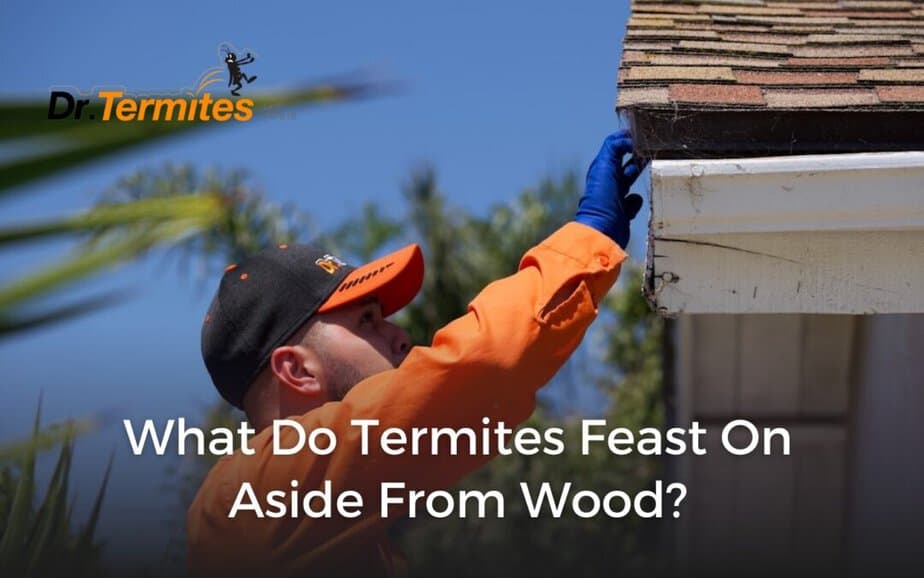
by pestcontrolseos | Jul 11, 2024 | Blog
When we think of termites, wood is often the first thing that comes to mind. These pests are notorious for causing extensive damage to wooden structures. However, termites consume more than just wood. They have varied diets that include several other materials. This blog will discuss what termites feast on aside from wood and how termite control can address the broader range of their food sources.
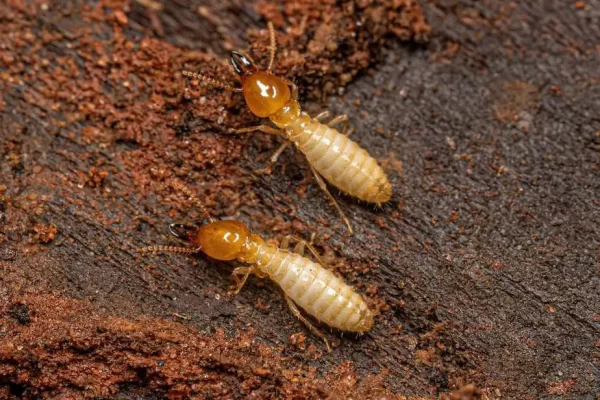
Termites’ Diverse Diet
Cellulose-Based Materials
Termites are primarily attracted to cellulose, an organic compound found in plants. Here are some common cellulose-based materials that termites consume:
-
Paper Products: Items such as cardboard, paper, and books can feed termites because they contain cellulose, which attracts these pests. Without proper storage, termites can significantly damage homes by consuming boxes and important documents.
-
Fabrics: Certain types of fabrics, especially those made from natural fibers like cotton and linen, attract termites. These materials contain cellulose, which termites can digest. Termites can ruin clothing, curtains, and upholstery if they infest areas with these fabrics.
-
Plants: Living and dead plants can also be a food source for termites. They often feed on the roots, stems, and leaves of various plants. This is particularly concerning in gardens and landscaped areas where termites can affect plant health and growth.
Drywall
Drywall consists of a paper covering wrapped around gypsum. The paper layer contains cellulose, making it another target for termites. Although drywall itself is not high in nutritional value, the paper backing provides enough cellulose to sustain termites. This can lead to structural damage in homes if termites create tunnels through the walls.
Carpet
Carpet backing often contains cellulose. Termites can feed on this layer, causing damage over time. While synthetic fibers are not attractive to termites, any natural fibers in the carpet can draw their attention. Infested carpets may show signs of wear and damage, necessitating costly replacements.
Insulation
Cellulose insulation, commonly used in homes, is another potential food source for termites. They can burrow into the insulation, leading to structural issues if left untreated. Insulation damage can reduce the effectiveness of thermal protection in homes, resulting in higher energy costs.
Furniture
Wooden furniture is an obvious choice for termites, but they can also attack furniture made from particleboard or covered with fabric. The cellulose in these materials provides sustenance for termites, leading to weakened furniture structures and aesthetic damage.
Books and Documents
Books, important documents, and even photographs can fall victim to termites. These items are often stored in basements or attics, places where termites are likely to inhabit. Damage to these irreplaceable items can be devastating.
Compost Piles
Compost piles in gardens can also attract termites. The decaying plant material in compost piles is rich in cellulose, providing an abundant food source for termites. Proper management of compost piles is essential to prevent termite infestations in gardens.
How Termite Control Can Help
Effective termite control is essential to prevent and manage infestations. Here are some strategies:
Regular Inspections
Conducting regular inspections helps identify early signs of termite activity. This allows for prompt action before significant damage occurs. Homeowners should look for mud tubes, discarded wings, and hollow-sounding wood as indicators of termite presence.
Moisture Control
Termites thrive in moist environments. Ensuring proper drainage and fixing leaks can reduce the likelihood of an infestation. Homeowners should keep gutters clean, ensure downspouts direct water away from the foundation, and avoid letting water pool near the home.
Barrier Treatments
Applying chemical barriers around a property can deter termites from entering. These treatments create a protective zone that termites cannot cross. Professional pest control services can apply these treatments effectively, providing long-term protection against termites.
Bait Systems
Bait systems attract termites and then eliminate them gradually. Placing these systems strategically around a property can help control termite populations effectively. These systems are less intrusive than barrier treatments and can be monitored regularly to assess their effectiveness.
Wood Treatments
Treating wood with chemicals can make it less attractive to termites. Borates are a common chemical used for treating wood, as they are toxic to termites but safe for humans and pets. Treated wood can be used in construction to add an extra layer of protection.
Reducing Food Sources
Removing potential food sources from the vicinity of your home can help reduce the risk of termite infestations. This includes clearing away dead wood, plant debris, and storing paper products in sealed containers.
Beyond Wood: Comprehensive Strategies for Effective Termite Control
Termites’ diets include not just wood but also various cellulose materials and items in homes and gardens. Understanding their diverse diets aids in creating effective termite control strategies. Key elements of termite control include regular inspections, managing moisture, using barrier treatments, bait systems, and treating wood. Reducing potential food sources can also protect your property from termite damage. Implementing these measures can prevent costly repairs and keep homes intact.
Protect your home from termites with Dr. Termites‘ advanced control techniques. Our experts provide thorough inspections and customized solutions to prevent and control termite damage. Schedule a consultation today for a termite-free home.
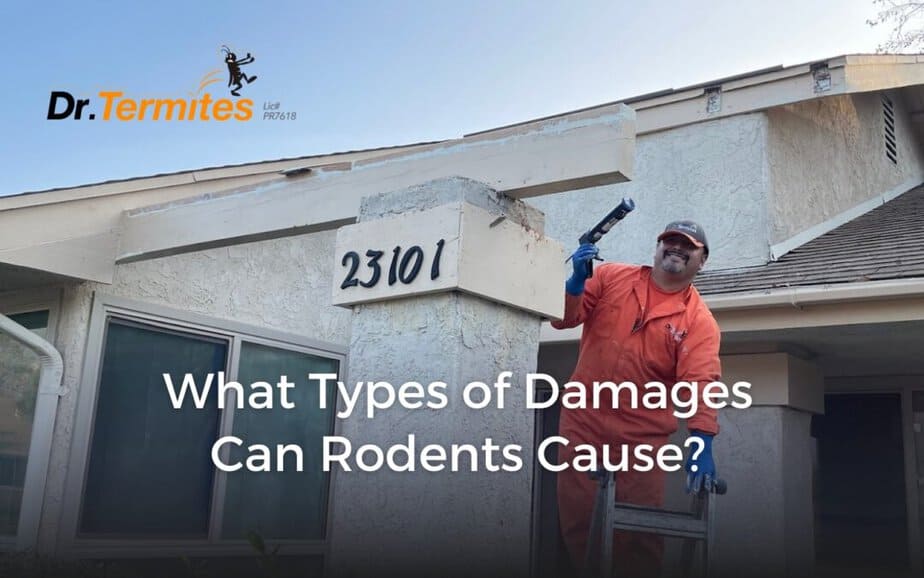
by pestcontrolseos | Jul 5, 2024 | Blog, Pest Info & Articles
Whether it’s destroying furniture, fouling up food, or spreading disease, rodents are unwanted visitors that can cause a lot of trouble. Buildings crumble, walls crack, and roofs cave in – the trail of destruction leaves families and entrepreneurs reeling, with health scares lingering long after.
The laid-back vibe of Ventura, CA, can make it easy to overlook the rodents that live among us, but ignoring the problem won’t make it go away – it’s time to take action and get smart about rodent control. When rodents get comfortable, the potential for destruction is immense – let’s break down the various types of damage they can cause.
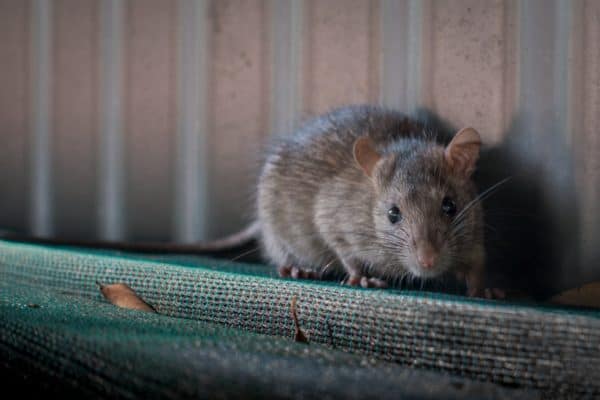
Structural Damage
Chewing and Gnawing
Rodents have strong teeth that grow continuously. They need to chew on things to keep their teeth sharp and short. This habit can lead to serious damage. They chew on wood, wires, pipes, and other materials. This can weaken the structure of buildings and lead to expensive repairs.
Electrical Damage
Rodents often chew on electrical wires. This is very dangerous because it can cause short circuits and fires. Electrical damage is one of the most serious risks posed by rodents. Regular inspections and rodent control in Ventura, CA can help prevent such issues.
Plumbing Issues
Rodents’ gnawing can also affect plumbing systems. They can chew through plastic and even metal pipes, causing leaks and water damage. Over time, these leaks can lead to mold growth and structural problems. In Ventura, CA, it’s wise to periodically check plumbing for signs of rodent activity to avoid extensive repairs.
Contamination
Food Contamination
Rodents search for food and can easily contaminate your pantry. They leave droppings, urine, and hair in food storage areas. This wastes food and poses health risks. Consuming contaminated food can cause illnesses like Salmonella and Leptospirosis. Proper food storage and rodent control in Ventura, CA can minimize these risks.
Water Contamination
Rodents can also contaminate water sources. They often nest near water pipes and tanks. Their waste can get into the water supply, leading to diseases. Keeping rodents away from water sources is crucial to maintaining a safe and healthy environment.
Health Risks
Diseases Spread by Rodents
Rodents can carry many diseases. Some of these can be transmitted to humans through direct contact, bites, or exposure to their waste. Common diseases include Hantavirus, Leptospirosis, and Salmonella. It’s essential to handle rodent control in Ventura, CA to protect your health.
Allergies and Asthma
Rodents can trigger allergies and asthma. Their droppings and urine can become airborne, causing respiratory issues. People with existing respiratory conditions are especially at risk. Proper cleaning and rodent control are necessary to reduce these health risks.
Parasites
Rodents can bring parasites like fleas, ticks, and mites into your home. These parasites can transfer to pets and humans, causing itching, rashes, and even severe illnesses. Regular pest control and hygiene practices can help keep these parasites at bay.
Property Damage
Furniture and Upholstery
Rodents can destroy furniture and upholstery. They chew on fabric, cushions, and wooden legs, causing significant damage. This can lead to costly replacements. In Ventura, CA, keeping an eye out for signs of rodent damage can help in taking early action.
Insulation Damage
Rodents often nest in insulation material. They tear it apart to create nests, which reduces its effectiveness. Damaged insulation means higher energy bills and less comfort in your home. Routine checks and rodent control measures can save you from these expenses.
Agricultural Damage
Crop Destruction
Rodents can cause extensive damage to crops. They feed on grains, fruits, and vegetables. This can result in significant losses for farmers. Effective rodent control in Ventura, CA is vital for protecting agricultural investments.
Livestock Feed Contamination
Rodents also target livestock feed. They contaminate it with their waste, making it unsafe for animals. This can affect the health of livestock and lead to financial losses for farmers. Keeping storage areas clean and secure is crucial to prevent such contamination.
Prevention and Control Measures
Sealing Entry Points
One of the best ways to prevent rodent damage is to seal entry points around your home or business. Rodents can squeeze through small gaps and cracks. Inspect your property regularly and seal any openings to keep rodents out.
Regular Cleaning
Keeping your environment clean can deter rodents. They are attracted to food scraps, clutter, and waste. Regularly clean your kitchen, pantry, and storage areas. Dispose of garbage properly and keep food in sealed containers. This can make your home less inviting to rodents.
Professional Pest Control
Sometimes, professional help is necessary to manage a rodent problem. Pest control experts can identify the extent of an infestation and implement effective solutions. If you are facing a serious rodent issue, consider hiring professionals for rodent control in Ventura, CA. They have the experience and tools needed to handle infestations safely and effectively.
Securing Serenity: Effective Strategies for Rodent Control
Rodents can cause a wide range of damages, from structural and electrical damage to contamination and health risks. They can also ruin furniture, insulation, and crops. If you live in Ventura, CA, it’s important to take rodent control seriously. Regular inspections and preventive measures can save you from costly repairs and health issues. By being proactive, you can protect your home, property, and health from the damages caused by rodents.
Protect your property, health, and wallet by taking action today. Contact Dr. Termites for a complete rodent control solution customized to your unique needs. Dr. Termites’ expert team specializes in safe and effective rodent infestation solutions. Contact us for an inspection and ensure a rodent-free home.
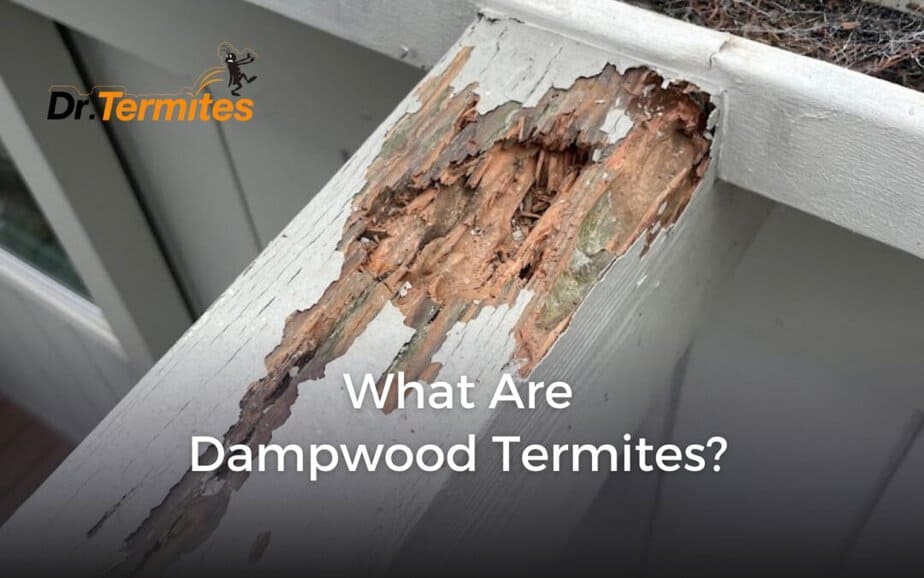
by pestcontrolseos | Jun 25, 2024 | Blog
When it comes to termite control in Ventura, CA, understanding the different types of termites that could infest your home is crucial. One such species is the dampwood termite.
These pests thrive in moist environments and can cause significant damage to wooden structures.
This article will provide you with comprehensive information on dampwood termites, including their habits, identification, prevention, and methods to eradicate them.

Dampwood vs Drywood vs Subterranean Termites
Understanding the distinctions between dampwood, drywood, and subterranean termites is essential for effective termite control. Termite species are unique from each other. They have different behaviors and habitats that influence their infestation patterns and treatment requirements.
By recognising these differences, homeowners can better protect their properties from termite damage.
How to Identify Dampwood Termites
Dampwood termites thrive in moist environments and infest wood with high moisture content. You’ll find them thriving in areas with high humidity and coastal regions where you’ll find plenty of decaying logs, stumps, and trees.
Here are other ways to identify dampwood termites from drywood and subterranean termites:
- Dampwood termites have a preference for wet wood and do not require contact with soil like subterranean termites. They create extensive galleries within the wood they infest, leading to structural damage over time.
- Signs of dampwood termite infestation include moist wood, internal wood damage, winged reproductives, liquid-like droppings, and occasional mud tubes.
- Dampwood termites typically nest in the wood they infest, while drywood termites establish colonies within the same piece of wood. Subterranean termites build elaborate underground nests connected to above-ground food sources through mud tubes.
- Dampwood termites prefer wet or decaying wood, while drywood termites target dry, sound wood. Subterranean termites feed on cellulose material found in various wood sources and plant debris.
- Dampwood termites are commonly found in areas with high moisture content, such as coastal regions or damp environments. Drywood termites infest dry wood structures like furniture and framing lumber. Subterranean termites access above-ground wood sources through soil contact and mud tubes.
- Each termite species requires specific treatment approaches tailored to their nesting habits and feeding preferences. Effective treatments for dampwood, drywood, and subterranean termites may include spot treatments with termiticides, fumigation for widespread infestations, heat treatments, or preventive wood treatments using borate-based products.
Understanding the differences between dampwood, drywood, and subterranean termites empowers homeowners to identify signs of infestation early, implement targeted treatment strategies, and protect their properties from termite damage effectively.
Learning the unique characteristics of each species can make it easier to make informed decisions regarding termite prevention and control measures.
Preventing Dampwood Termite Infestations
Consistent monitoring is essential for preventing extensive damage.
Homeowners should periodically do the following:
- Fix any leaks in plumbing, roofs, or gutters promptly. Ensure proper drainage around your home’s foundation to prevent water accumulation.
- Good ventilation helps reduce humidity levels in your home. Use dehumidifiers in areas prone to moisture build-up like basements and crawl spaces. Ensure that attics are well-ventilated to prevent damp conditions.
- Keep wood elevated and covered to prevent it from becoming a breeding ground for termites.
- Seal any cracks or crevices in your home’s foundation, walls, and around windows and doors. This can prevent termites from gaining entry into your home.
- Regularly inspect wooden structures for signs of moisture damage and repair them promptly. Maintain your home’s exterior by painting or sealing wood surfaces to protect them from moisture.
- You can also use orange oil treatment. Extracted from orange peels, this eco-friendly remedy is not only effective but also safe for your family and pets. Orange oil works by dissolving the exoskeleton of pests on contact, penetrating deep into crevices where they hide.
Identifying Dampwood Termite Infestations
Recognising the presence of dampwood termites is crucial for effective termite control and safeguarding your property from potential damage. Dampwood termites differ from other termite species in their habitat preferences and behaviors, making their identification essential for targeted treatment.
By understanding the signs of a dampwood termite infestation, homeowners can take proactive steps to address the issue promptly.
Signs of Infestation
- Dampwood termites are attracted to wet or decaying wood with high moisture content. Check for areas in your home where wood feels damp to the touch or displays moisture stains, indicating a potential infestation.
- Dampwood termites create extensive galleries within the wood they infest, leading to structural weakening. Look for signs of internal wood damage such as hollow-sounding timber when tapped, blistering on wooden surfaces, or visible tunnels within the wood.
- Swarmers, or winged reproductive termites, emerge from the colony to establish new ones. Observing these insects or their discarded wings near windowsills, light fixtures, or other entry points can suggest an active infestation within your property.
- Dampwood termite droppings differ from those of drywood termites, appearing more liquid and less pellet-like. Finding these droppings around wooden structures can indicate the presence of dampwood termites.
- While less common than with subterranean termites, dampwood termites may construct mud tubes to maintain moisture levels within the infested wood. Keep an eye out for these structures near affected areas.
Importance of Choosing a Local Professional Exterminator
Selecting a local professional exterminator for termite control in Ventura, CA, can make a significant difference in the effectiveness of your pest management efforts. Local expertise and years of service in the area provide invaluable benefits that contribute to successful termite eradication and long-term protection for your property.
Familiarity with Regional Termites
Local professional exterminators have a deep understanding of the specific termite species that are prevalent in Ventura, CA. Their familiarity with the behavior, habits, and nesting preferences of regional termites enables them to tailor treatment plans that target the species most likely to infest your property. This targeted approach increases the efficiency and effectiveness of termite control efforts.
Knowledge of Local Conditions
Ventura, CA, experiences unique environmental conditions that can influence termite activity. Climate, soil composition, and vegetation are factors impacting termite infestations in the area. Local professional exterminators are well-versed in these environmental nuances and can adjust their treatment strategies accordingly. Their ability to adapt to local conditions ensures that your termite control measures are optimized for maximum impact.
Intimate Understanding of Structures in the Area
Local professional exterminators possess in-depth knowledge of the construction styles and materials commonly used in Ventura, CA. This familiarity with local building structures allows them to identify potential vulnerabilities that may attract termites. By conducting thorough inspections tailored to the specific characteristics of Ventura properties, local exterminators can pinpoint areas at risk of termite infestation and implement preventive measures proactively.
Community Reputation and Trust
Years of service in the area contribute to a local professional exterminator’s reputation within the community. Established pest management companies build trust with residents through consistent quality service, reliable results, and a commitment to customer satisfaction. Choosing a well-respected local exterminator with a proven track record ensures that you are receiving expert care from a trusted provider.
Quick Response and Accessibility
Local professional exterminators are readily available to address termite infestations promptly. Their proximity to Ventura allows for swift response times and easy accessibility for inspections, treatments, and follow-up visits. In urgent situations where immediate action is required to mitigate termite damage, a local exterminator can offer rapid assistance to protect your property.
Local Regulations Compliance
Professional exterminators operating in Ventura, CA, are familiar with local regulations and guidelines governing pest control practices. By choosing a local provider, the treatment methods used will comply with relevant laws and standards. Compliance with local regulations ensures the legality of pest management activities. It also upholds ethical practices that prioritize environmental protection and public safety.
Support for Local Businesses
Opting for a local professional exterminator contributes to supporting the local economy and fostering community growth. By investing in local pest control services, you’re sustaining small businesses, creating job opportunities, and strengthening the economic vitality of Ventura, CA.
Choosing a local provider aligns with a commitment to local sustainability and community development.
Personalized Customer Care
Local professional exterminators prioritize personalized service and individualized attention for each client. Their focus on building relationships with customers fosters open communication, transparency, and a collaborative approach to termite control.
A local provider can provide better and more dedicated support, ongoing guidance, and a high level of customer care throughout the pest management process.
Long-Term Support
Establishing a relationship with a local professional exterminator creates the foundation for a long-term partnership focused on protecting your property from termites.
Local providers offer continued support through regular inspections, maintenance treatments, and proactive monitoring to prevent future infestations.
Partnering with trusted local exterminators gives you the peace of mind knowing that your home is safeguarded against termite threats for years to come.
By recognising the importance of choosing a local professional exterminator with years of service in Ventura, CA, you can benefit from their expertise, tailored solutions, community trust, and commitment to excellence in termite control.
Trusting a local provider ensures your property comprehensive protection from termites while supporting the growth and well-being of the local community.
Conclusion
Understanding dampwood termites and how to manage them is crucial for protecting your home from damage. By recognising signs of infestation early, taking preventative measures, and choosing local professional termite control in Ventura, CA, you can effectively safeguard your property from these destructive pests.
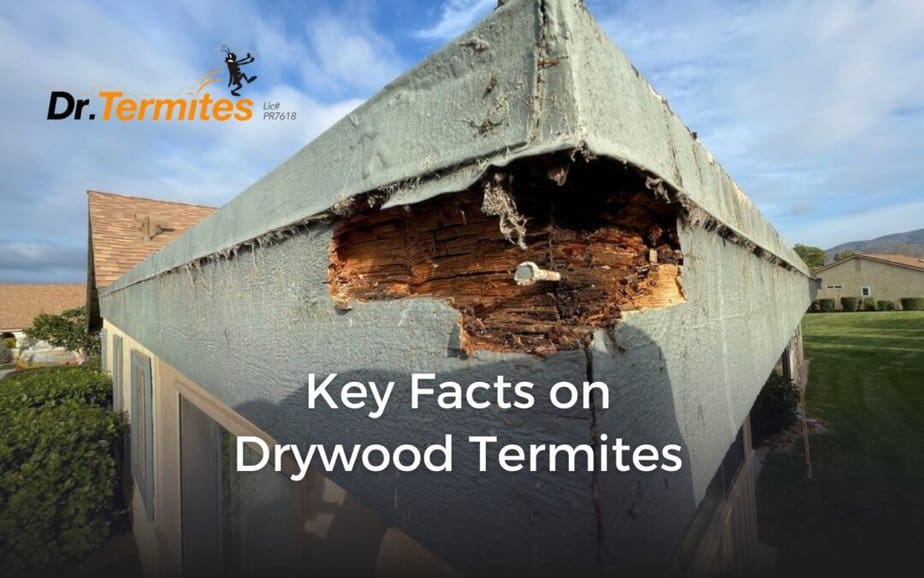
by pestcontrolseos | Jun 19, 2024 | Blog
Did you know that drywood termites are some of the hardiest creatures known to man, requiring no more than the moisture it gets from the wood that it eats?
Truly, drywood termites are fascinating creatures. But, for homeowners dealing with drywood termites, they’re anything but.
When it comes to termite control in Ventura, CA, dealing with drywood termites can be a nightmarish situation. These pests can cause extensive damage to wooden structures, furniture, and other items made of wood.
This article aims to provide comprehensive information on drywood termites, helping you understand their habits, how to identify them, and effective methods to get rid of them.
Understanding Drywood Termites
Drywood termites are a type of termite that infest dry wood. Unlike subterranean termites that require contact with soil, these pests live and feed inside the wood they infest. They don’t need any contact with the ground, which means they can establish colonies in a variety of wooden structures including homes, furniture, and even picture frames.
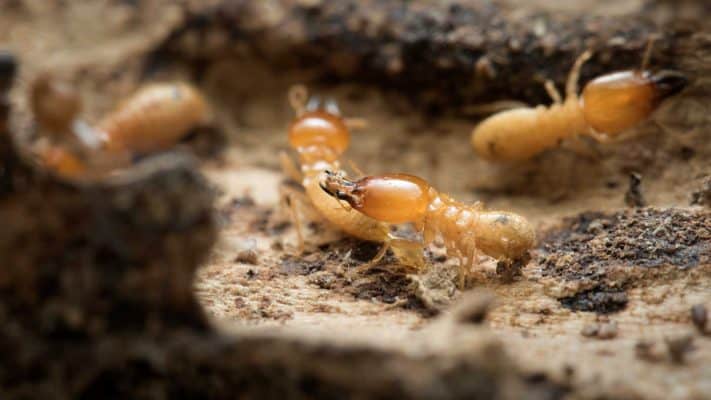
Behavior and Habits
Behaviour and Habits Drywood termites are known for their stealthy nature. They often go unnoticed until they have caused significant damage. These insects prefer dry conditions and can extract moisture from the wood they consume. This makes them particularly challenging to detect since there are no external signs like mud tubes which are common with other termite species.
Life Cycle
The life cycle of drywood termites includes three main stages: egg, nymph, and adult. The queen can lay thousands of eggs during her lifespan. Once the eggs hatch, the nymphs go through several molts before reaching adulthood. The entire process can take several months to a year, depending on environmental conditions.
Identifying Drywood Termite Infestations
Recognising the presence of drywood termites early on is critical in preventing extensive damage to your property.
Signs of Infestation
- Frass: Drywood termites produce distinctive faecal pellets, known as frass, which are often found in small piles near the infested wood. These pellets are usually hexagonal and resemble grains of sand or sawdust. The presence of frass is a clear indication of termite activity within the wood.
- Kick-out Holes: These termites create tiny holes in the wood to push out their frass. These ejection points, also known as kick-out holes, are typically small and round, often appearing on wooden surfaces. Spotting these can indicate an active infestation inside the wood.
- Swarmers: Winged termites, or swarmers, are reproductive termites that leave the colony to start new ones. These swarmers are attracted to light and are often found near windowsills or light fixtures. Discovering discarded wings in these areas can be a sign of an infestation.
- Wood Damage: Drywood termites consume wood from the inside out, which can lead to significant structural damage. Tapping on infested wood may produce a hollow sound, indicating that the interior has been compromised. Additionally, you may notice blistering on wooden surfaces, which suggests internal cavities created by termites.
- Termite Droppings: These pests leave behind droppings that can resemble coffee grounds or pepper. Finding these droppings around wooden structures is another sign that termites may be present.
Inspection Techniques
Effective inspection techniques are essential for identifying drywood termite infestations.
Here are some methods used by professionals:
- A thorough visual examination of wooden structures can reveal signs of termite activity. Look for visible damage, kick-out holes, and frass piles. Inspect areas that are prone to moisture, as termites are attracted to damp wood.
- Lightly tapping wooden surfaces with a hammer or screwdriver can help detect hollow areas that indicate internal damage. If the wood sounds hollow or produces a dull thud, i
- Moisture meters measure the moisture content within wood. Termites require moisture to survive, so higher moisture levels can indicate potential problem areas. Professionals use moisture meters to identify sections of wood that may be at risk.
- A borescope is a tool with a small camera on the end of a flexible tube, allowing inspectors to look inside walls and other hard-to-reach areas without causing damage. This tool is particularly useful for detecting hidden termite activity within wooden structures.
- Acoustic Emission Devices detect the sounds produced by termites as they chew through wood. By amplifying these sounds, inspectors can pinpoint areas of activity that might not be visible to the naked eye.
- Infrared thermography can be used to detect temperature variations in wood structures. Termite colonies generate heat, and infrared cameras can identify these heat signatures, helping to locate infestations behind walls and other concealed areas.
- Using a sharp instrument like an awl or screwdriver, inspectors can gently probe wooden structures to check for soft spots and internal cavities caused by termite activity. This method helps confirm the extent of the damage.
- Specially trained dogs can detect the scent of termites with remarkable accuracy. These dogs can be used to inspect large areas quickly and efficiently, making them a valuable asset in termite detection.
Treatment Options for Drywood Termites
Regular monitoring is crucial in keeping drywood termite infestations under control. Homeowners should perform periodic checks of wooden structures, especially in areas prone to infestations such as attics and basements.
But, in case of an actual infestation, these are the most common treatment options available to homeowners and business owners:
Spot Treatments
Spot treatments are ideal for localized infestations. These involve injecting termiticide directly into the infested wood. This method is effective but may not be suitable for large infestations.
Fumigation
Fumigation is a comprehensive method used to eliminate drywood termites from an entire structure. During this process, the building is covered with a tent and a gas fumigant is released inside, permeating all wood within the structure. This method ensures that all termites are eradicated.
Heat Treatments
Heat treatments involve raising the temperature of the infested area to a level that is lethal to termites. This method is effective and environmentally friendly.
Wood Treatments
Applying borate-based products to wood can prevent infestations. These treatments penetrate the wood and create an environment that is inhospitable to termites.
Choosing the Right Professional Exterminator
Selecting the right professional exterminator is crucial for effectively managing a drywood termite infestation. With numerous options available, making an informed choice ensures that your property receives the best possible care.
Here’s how to choose the ideal exterminator for your needs.
Experience and Expertise
When looking for professional termite control in Ventura, CA, it’s essential to choose a company with experience and expertise in dealing with drywood termites. Look for companies that have positive reviews and a proven track record.
Certifications and Training
Certifications serve as a testament to an exterminator’s proficiency. Ensure that the professionals you consider hold relevant certifications from recognised pest control authorities. These certifications indicate that they have undergone rigorous training and adhere to industry standards. Additionally, inquire about ongoing training and continuing education, which helps exterminators stay updated with the latest techniques and technologies.
Licensed and Insured
Ensure that the exterminator is licensed and insured. This protects you in case of any damages or issues during the treatment process.
Use of Advanced Technology
Modern termite control leverages advanced technology for better detection and treatment. Enquire about the tools and techniques used by the exterminator. Companies employing state-of-the-art equipment, such as infrared cameras, moisture meters, and acoustic emission devices, can offer more precise and effective termite management.
Comprehensive Services
Select a company that offers a range of services including inspection, treatment, and follow-up visits. This ensures that any potential issues are addressed promptly and effectively.
Eco-Friendly Solutions
Consider companies that offer eco-friendly options for termite control. These methods are effective and minimize environmental impact. For example, here at Dr. Termite, we use a powerful, natural solution that you might be familiar with – orange oil. Extracted from the rinds of citrus fruits, this natural remedy packs a punch against a variety of household insects, including drywood termites.
Local Knowledge
Local exterminators have an advantage due to their familiarity with regional termite species and environmental conditions. They understand the specific challenges posed by termites in your area and can tailor their strategies accordingly. Choosing a local expert ensures that you benefit from this invaluable local knowledge.
Guarantee of Service
A confident exterminator stands by their work with a guarantee of service. This warranty ensures that if termites reappear within a specified period after treatment, the company will return to address the issue at no additional cost. A service guarantee provides peace of mind and underscores the exterminator’s commitment to quality.
Follow-Up Visits
After initial treatment, follow-up visits are crucial to ensure that the infestation has been fully eradicated. A diligent exterminator will schedule these visits to monitor the situation and take additional steps if necessary. Regular follow-ups demonstrate a commitment to long-term termite control and customer satisfaction.
By considering these factors, you can confidently select a professional exterminator who will effectively manage your drywood termite infestation, ensuring the safety and integrity of your home.
Conclusion
Understanding drywood termites and how to manage them is crucial for protecting your home from damage. By recognising signs of infestation early and taking preventative measures, you can keep these pests at bay.
When dealing with an infestation, it’s important to choose professional termite control in Ventura, CA that offers effective solutions tailored to your needs.
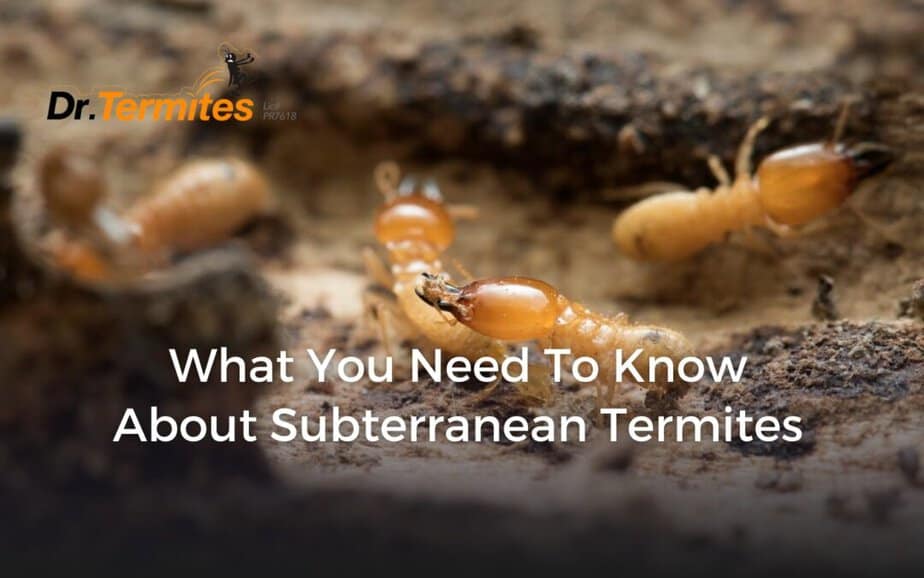
by pestcontrolseos | Jun 14, 2024 | Blog
Subterranean termites are among the most destructive pests that can invade your home, causing extensive and costly damage.
According to this research, just one specific kind of termite was responsible for up to $2 billion in damage annually throughout the 80s. This number can only have grown since.
Whether you’re a homeowner or a professional handling termite control in Ventura, CA, this guide will be an invaluable resource.
If you are seeking information on termite control, these are the only insights you’ll need.

Understanding Subterranean Termites
By understanding subterranean termites’ behavior, habitat preferences, and impact on structures, homeowners and professionals can implement effective preventive measures and control strategies.
What Are Subterranean Termites?
Unlike dry-wood termites, which can live in the wood they consume, subterranean termites require contact with the soil to survive, as they need moisture to maintain their colonies.
Life Cycle
The life cycle of subterranean termites is complex, involving several stages and castes that each have specific roles within the colony. Workers are responsible for foraging, feeding other termites, and maintaining the nest. They are the most numerous caste and are directly involved in causing structural damage as they chew through wood to gather cellulose. Soldiers, distinguishable by their larger heads and mandibles, defend the colony against predators such as ants. Without soldiers, the colony would be vulnerable to attacks. The reproductive caste includes the king and queen, whose sole purpose is to reproduce and expand the colony.
Behavior
Subterranean termites build extensive tunnel systems, known as mud tubes, to travel between their nest and food sources. These tunnels protect them from predators and help maintain the necessary humidity levels. The termites create these tubes using soil, wood particles, and saliva. They can extend for considerable distances, allowing termites to access food sources above ground while remaining connected to their moisture-rich nest.
Habitat
Subterranean termites thrive in environments with abundant moisture. They are typically found in soil and wood that is in direct contact with the ground. Areas with poor drainage or persistent dampness are particularly attractive to these pests. This preference for moist conditions means that structures with leaky pipes, improper drainage, or high humidity levels are at a higher risk of infestation.
Termite control in Ventura, CA, where the climate is generally mild and conducive to termite activity year-round, is especially crucial.
Feeding Habits
Subterranean termites feed primarily on cellulose, an organic compound found in wood, paper, and other plant materials. They digest cellulose with the help of protozoa and bacteria in their guts. This ability to break down cellulose makes them capable of consuming a wide range of materials, including structural timber, flooring, wallpaper, and even books. Their feeding habits can result in extensive damage before any visible signs of infestation become apparent.
Structural Impact
The damage caused by subterranean termites can be severe and costly to repair. As they consume wood from the inside out, they often leave only a thin veneer intact, making detection difficult until significant damage has occurred. Termite infestations can compromise the structural integrity of buildings, leading to costly repairs and potential safety hazards.
Seasonal Activity
Subterranean termites exhibit seasonal activity patterns, with increased activity during warmer months when conditions are favorable for foraging and reproduction. In spring and summer, reproductive termites (swarmers) emerge from the colony to mate and establish new colonies. This swarming behavior is often the first visible sign of a termite infestation.
Identification
Correct identification of subterranean termites is crucial for effective management. They are usually light brown or creamy white in color and have a soft body with straight antennae. The workers are typically about 1/8 inch long, while soldiers have larger heads equipped with strong mandibles.
How to Prevent a Subterranean Termite Infestation
- Moisture Control – Since subterranean termites need moisture to survive, controlling moisture around your property is essential. Fix leaking pipes, ensure proper drainage, and reduce humidity in crawl spaces to create an inhospitable environment for termites.
- Barriers – Physical barriers like stainless steel mesh or sand can be installed during construction to prevent termites from accessing wooden structures. These barriers are effective in deterring termite entry.
- Regular inspections: Trained exterminators can identify subtle signs of termite activity that might go unnoticed by untrained eyes, helping detect infestations early and prevent extensive damage while reducing treatment costs.
Effective Termite Control Techniques
These comprehensive techniques can help homeowners and professionals maintain effective termite control and prevent future infestations.
Soil Treatments:
There are two main types of termiticides: repellent and non-repellent. Repellent termiticides act as a barrier that termites avoid. However, these can sometimes be less effective because termites may find ways around them. Non-repellent termiticides, on the other hand, are undetectable by termites.
When termites come into contact with these substances, they transfer them back to the colony, effectively spreading the toxic effect throughout the nest.
Baiting Systems
Baiting systems are an innovative and environmentally friendly alternative to traditional methods. These systems involve placing bait stations around the property, typically in the ground where termite activity is suspected. The bait contains a slow-acting toxin that worker termites carry back to their colony, where it is shared with other members, including the queen.
The delayed action of the toxin ensures that it spreads throughout the colony before the effects become evident, leading to its eventual collapse. Baiting systems require regular monitoring and maintenance to ensure effectiveness.
Professional exterminators will check and replenish bait stations periodically, adjusting the strategy as needed based on termite activity.
Wood Treatment
Wood Treatment Treating wood directly with termiticides is another effective way to protect structures from termite damage.
Wood treatment can be done using surface sprays, injections, or pressure treatments. Surface sprays and injections are suitable for existing structures, where specific solutions are applied directly to exposed wood surfaces or injected into small holes drilled into the wood.
Pressure treatments are typically used for new construction, where wood is treated under high pressure to ensure deep penetration of the treatment.
Integrated Pest Management (IPM)
Preventive measures include controlling moisture around the property, removing wood-to-soil contact, and using termite-resistant building materials. Regular inspections are a critical component of IPM, allowing for early detection of infestations and timely intervention.
When termite activity is detected, targeted actions such as baiting systems or soil applications are used to eliminate the colony. By integrating multiple strategies, IPM provides a holistic solution that addresses both immediate termite threats and long-term prevention.
Physical Barriers
Physical barriers can be an effective preventive measure against subterranean termites. Common barrier materials include stainless steel mesh and graded stone particles.
Stainless steel mesh is installed around foundations and other vulnerable areas. The fine mesh openings are too small for termites to pass through, effectively blocking their entry. Graded stone particles work by creating a layer of material that is difficult for termites to navigate. The particles are too heavy and irregularly shaped for termites to move, preventing them from constructing tunnels through the barrier.
Biological Control
Biological control methods involve using natural predators or pathogens to manage termite populations. One promising biological control agent is nematodes—microscopic worms that parasitize termites. These beneficial nematodes can be introduced into termite-infested areas, where they seek out and infect termites, leading to their death.
Another biological control method involves fungi that specifically target termites. These fungi can be applied to infested wood or soil, where they infect and kill termites upon contact.
Heat Treatment
Heat treatment is an eco-friendly method that involves raising the temperature of infested areas to levels lethal to termites. This technique is particularly effective for drywood termites but can also be used for subterranean termites in certain situations.
During heat treatment, specialized equipment is used to heat the air in the infested area to at least 120°F (49°C). The high temperature penetrates wood and other materials, killing termites at all life stages.
Heat treatment requires careful monitoring to ensure that the target temperature is maintained long enough to effectively eliminate the infestation.
Cold Treatment
Cold treatment is another method for termite control. This technique involves using liquid nitrogen or other refrigerants to lower the temperature of infested areas to levels that are lethal to termites.
Cold treatment is typically used for localized infestations in small areas. Liquid nitrogen is applied directly to infested wood or injected into small holes drilled into the structure. The extreme cold kills termites upon contact without leaving any residue.
Electrical Methods
Electrical methods use high-voltage currents to kill termites within wood structures. This technique involves inserting electrodes into infested wood and delivering an electric current that destroys termites on contact. Electrical methods can be effective for treating localized infestations without using toxic substances.
One advantage of electrical methods is their ability to penetrate deep into wood, reaching termites hidden within galleries and tunnels.
Orange Oil Treatment
Next time you reach for an orange, don’t discard the peel just yet! The essential oil extracted from citrus rinds, orange oil, holds a hidden power – the ability to control a variety of household pests.
Unlike traditional pesticides, orange oil boasts a pleasant citrus scent, making it ideal for indoor use.
Orange oil is readily available in various forms, such as sprays and diffusers. ⚠ Highly likely to be human. You’re all set! This content reads as if it is human-written. While effective for specific pest problems, a professional pest control company can create a customized plan for your unique situation
Conclusion
Subterranean termites pose a significant threat to properties due to their destructive nature and ability to remain hidden for long periods.
By understanding their behavior, recognizing signs of infestation, and implementing effective control methods, you can protect your property from these relentless pests. If you need professional assistance with termite control in Ventura, CA, don’t hesitate to reach out to experts who can provide tailored solutions for your specific situation.








































